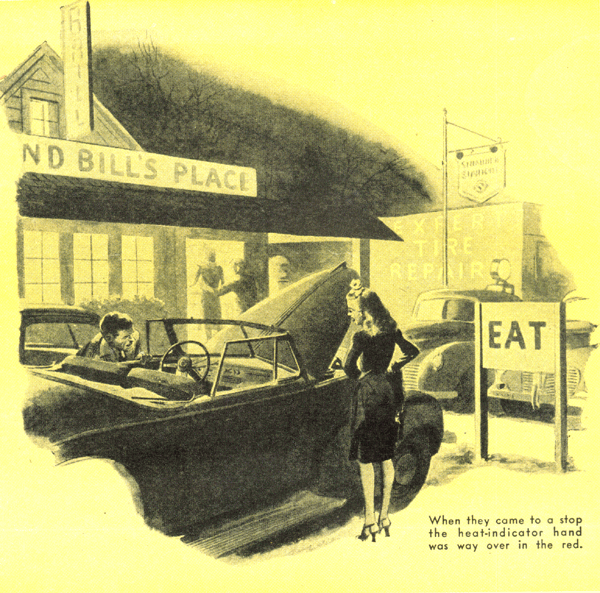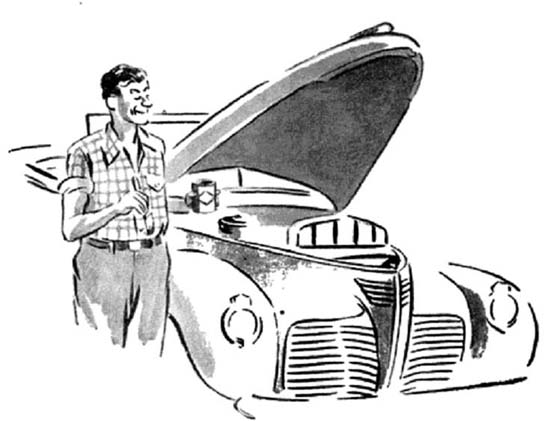November 1945
GUS EXPLODES A MYTH
by Martin Bunn
A Familiar Car Story Winds Up In The Model Garage

Gus Wilson stared at the big young man, garbed in flashy sports clothes, with that embarrassed feeling we all have when we know we've met someone sometime some place but can't remember where or when.
Then he laughed. Don Gordon, of course! Gus had seen him only a week earlier, but then Sergeant Gordon had just come back to town with five overseas bars on the sleeve of his O.D. blouse, a combat infantryman's badge and a miniature rainbow of service ribbons on his breast. Clothes, Gus thought, do make a difference.
Don grinned and directed attention to his sporty scenery with a sweeping gesture.
"Like 'em?" he asked. "Pretty nifty, hey? Mister, you're looking at a civilian -- and am I glad!"
"First off," Gus chuckled, "I thought you were one of the minstrel men from that show they've got down at the Opera House. Well, you've earned the right to wear any kind of clothes you want to -- even if they are sort of hard on the neighbors' eyes . . . Get your car fixed up yet, Don?"
"Yes, sir," Don replied proudly. "It's like me -- so darned shined up you won't know it. I've been working on it most of the time since I got home -- painting, polishing, and one thing and another. That bus gleams, Mr. Wilson -- just gleams!"
"That's all fine," Gus said with a wry smile. "But there's something that has always seemed to me to be almost as important as how a car looks -- I mean, how it runs."
Don perched on Gus's workbench and pulled on a cigarette he was smoking.
"Well, now you mention it, I'm having a little trouble with how it runs," he admitted. And that's one reason I'm here to see you. It showed up the first time last night. I met a cute number and took her out for a ride. When we were three or four miles out of town she thought she smelled something burning. I took a sniff, and it did smell that way. Then I looked at the heat indicator and saw the hand way over in the red.
"I thought I'd better stop, but when I pulled over to the side of the road to a nice dark spot, my date wouldn't have it. "You'd better keep on driving whether you and your jalopy burn up or not," she says. So I went on a little farther until we came to a roadside grill."
Gus laughed out loud. Don grinned sheepishly and went on: "We went in and had a sandwich. Stayed maybe an hour talking and playing the juke box. Then when we came out, the heat indicator was back where it belongs. But it was over in the red again before I got the girl friend home -- and before I got home I had to stop for half an hour to let the engine cool off again."
Don paused a moment to light another cigarette from the butt of the one that was almost consumed, and Gus waited patiently.
"First thing this morning," Don went on, exhaling a cloud of smoke, "I got busy on troubleshooting. Ted Chambers helped me -- he's a guy who moved in next door while I was away, and he knows his automobiles. We couldn't find a thing wrong -- the radiator doesn't leak, and it wasn't dry or stopped up or anything like that. The fan belt wasn't loose, and the muffler wasn't clogged.
"Ted says that the overheating must be caused by carbon in the cylinders, or by the valve timing being off, or by the water pump. That stuff's too complicated for me, so I drove the bus over here. And the heat indicator is over in the red on the temperature gauge again!"
"Drive it in," Gus invited.
A strong reek of scorched paint preceded Don's much-polished convertible into the Model Garage shop, so when Gus raised its hood he wasn't surprised to find the engine resplendent with a newly applied coat of fire-truck red paint.
"What artist did this job?" he asked.
"I did," Don said, self-satisfaction in his tone. "Ted Chambers came in while I was touching up a few little cracks and said I ought to paint the engine to keep it from rusting. It makes it look a lot better."
Gus grunted and then examined the radiator. "I suppose it was 'Ted Chambers' idea to paint the radiator core red, too, wasn't it?" he demanded.
"Yes, it was," Don assented. "There was enough paint left after I'd finished the engine. Looks swell, doesn't it?"
"That's a matter of taste, I guess," Gus replied, lowering the hood.
"Aren't you going to look at the cylinders and those other things?" Don asked in a surprised voice.
"There's no need to look at anything else," Gus said. "That hot paint job is what's raising hob with your cooling system."
Don's mouth gaped. Then he laughed. "Quit kidding me, Mr. Wilson. How could paint have anything to do with the engine overheating? When you get a new car, its engine is painted, isn't it?"
"It is," Gus agreed. "But it's painted with a special kind of paint that doesn't lock in the heat. You didn't use that kind -- just ordinary paint paint that prevents proper dissipation of the heat by the metal of the engine. That was bad enough, but when you painted the radiator core you really hit the jackpot. By doing that you retarded the cooling action of the fins to such a degree that they can't throw off the heat fast enough to keep the water from boiling."
"Well," Don gasped, "I'll be darned! A little thing like that to make all that trouble! Why, Ted Chambers says -- "
"If I were you," Gus told him grimly, "I'd forget what Ted Chambers says -- or at least check with somebody who knows what he's talking about before you take Ted's advice. Now, I'll tell you what to do, Don. Go over to the hardware store and buy a can of paint remover. Then go to work on your radiator core and your engine and get every bit of paint off them you possibly can. Don't forget to disconnect your battery before you start -- paint remover is inflammable and any little spark might start a fire. When you've got rid of the paint, or as much of it s you can, you won't have any more trouble with the engine overheating."
A few days later Don reported that by hard work he had managed to get most of the paint off the radiator core and the engine and that his auto trouble seemed to be over.
During the next couple of months Gus saw him now and then when he stopped at the Model Garage for gas, and Don always boasted that his car was "running better than it did when it was new." Then came the first real cold night of winter, and among the numerous phone calls for help next morning was one from Don Gordon.
"You'll have to send your wrecker up and tow my bus in," he moaned. "The engine block's cracked wide open. I can't understand how it happened, either. Why, Ted Chambers said -- "
Gus was having a hectic morning with S O S's over the phone just then, and he didn't care nor want to take time to hear what Ted Chambers had said. "I'll send the wrecker as soon as I can, Don," he promised, and hung up.
Late that afternoon Stan Hicks, the Model Garage's grease monkey, towed Don's convertible -- still highly polished -- into the shop. Don climbed out of the wrecker with a face as long as his arm.
"Believe me, Mr. Wilson, this is a bad break," he said. "This job's going to cost plenty, but the worst of it is that I've got to have a car to get to work in. How soon can you fix it up?"
"Let's see what's the matter with it first," Gus said. He raised the hood, examined the engine block carefully, and shook his head. "I'm sorry, Don," he told him, "but there's only one answer -- a new block. And getting one in a hurry isn't going to be easy either."
He sniffed at the engine a couple of times. "Don't tell me you forgot to put in antifreeze!"
Don's face turned crimson. "Wait," he admitted, "I didn't exactly forget, but I kept putting it off. I thought the engine was protected anyway."
"Protected?" Gus asked with a start. "Protected against what?"
"Protected against the engine block cracking even if it did freeze," Don explained.
"Protected by what?" Gus persisted.
"Why, by freeze-out plugs," Don told him. "My engine's got them."
"Ted Chambers told you so, I suppose," Gus said.
"Yes, he did," Don confessed. "But I saw them myself. While I was getting that paint off the engine block a couple of months ago, I noticed several little round metal plugs just about the size of a quarter on the lower part of the block. Ted was around, and I asked him what they were for. He told me they were freeze-out plugs -- that some manufacturers put them in engine blocks so that, if the engine did happen to freeze up, the plugs would pop out."
He reached under the hood and brought out a couple of round metal plugs. "See, here are two of them right here," he said eagerly. "They were popped out by the ice, just as Ted Chambers said they would be, but somehow they didn't keep the engine block from cracking."
Gus shook his head sadly. "This Ted Chambers you're always quoting," he said, "where did he learn all this stuff he says he knows about automobiles?"
"Oh, I dunno -- he took a course in some college," Don replied.
"He'd better go back and take another course -- and in a different college," Gus growled. "Either that, or stop passing out misinformation that gets people in trouble. Well, you're not the first car owner who has got well stung through believing that yarn about freeze-out plugs. A lot of people call them that, but they're really welch plugs, and their only purpose is to close up the holes made by the core-sand legs when the block was cast in the foundry. Sometimes they are forced out when the water inside an engine block freezes solid, but they never keep the block from cracking."
Don's face looked the way it must have when his division was smashing out of the Remagen bridgehead. "I'm going after Ted Chambers, and -- "
Gus laughed. "Take it easy," he advised good-naturedly, "A sap can't help being a sap -- but you don't have to be another one by believing everything he says. You'll be getting a bargain if you learn that for what a new engine block costs!"
END
L. Osbone 2019
